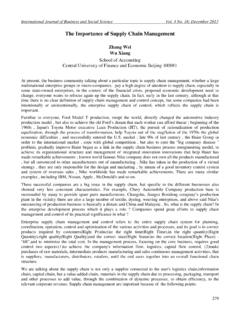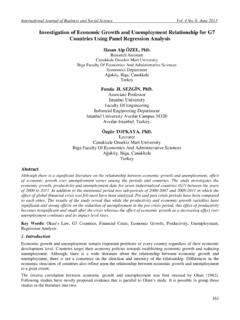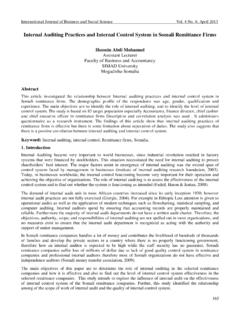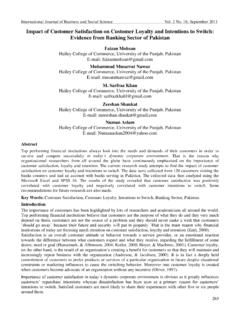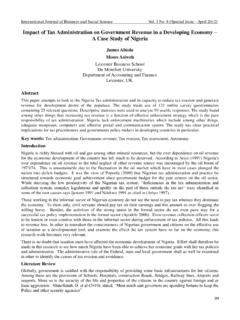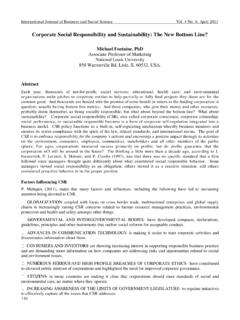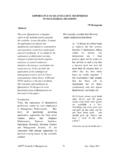Transcription of The Role of Marketing Information System on …
1 International Journal of Business and Social Science Vol. 2 No. 3 [Special Issue - January 2011] 175 The Role of Marketing Information System on Decision Making "An Applied study on Royal Jordanian Air Lines (RJA)" Dr. Shaker Turki Ismail Head of Marketing Department Philadelphia University Box (1) ,Code: 19392- Amman- Jordan. Abstract Purpose-This study aims at highlighting the significance and importance of utilizing Marketing Information System (MKIS) on decision-making, by clarifying the need for quick and efficient decision-making due to time saving and preventing of duplication of work.
2 Design-methodology-approach- The study shows the roles of each parts of MKIS for developing Marketing strategy, which present a real challenge to individuals and institutions in a an era characterized by uncertainty. And clarifying the importance of each part separately, depending on decision type and the nature of the situation. The empirical research method was evaluated by specialized experts, conducted by means of questionnaires. Correlation analysis were employed to test the validity of the procedure. Findings- The empirical study findings confirmed positive relationships between the level of utilizing and adopting decision support System & Marketing intelligence and the success of an organizational decision making, and provide the organisation with a competitive advantage as it allows the organisation to solve problems.
3 Originality/value The study offer better understanding of performance- increasing market share as an organizational decision making based on Marketing Information System . Keywords: Data Base (Internal Records), Marketing Research, Marketing Intelligence, decision support System , decision-making. 1. Introduction Marketing activities are directed toward planning, promoting, and selling goods and services to satisfy the needs of customers and the objectives of the organizations; Marketing Information systems (MKIS) support decision making regarding to these activities (Harmon, 2003).
4 (MKIS) is a continuing and interacting structure consist of people, equipment and procedures designed to gather, sort, analyze, evaluate and distribute needed, timely and accurate Information to Marketing decision makers; it begins and end with Information users- Marketing managers, internal external partners, and others who need Marketing Information . (Kotler and Armstrong, 2008). A good Marketing Information System balances the Information users would like to have against what they really need and what is feasible to offer. James A. (1998) defined Marketing Information System as A structured, interacting complex of persons, machines and procedures designed to generate an orderly flow of pertinent Information collected from both intra and extra-firm sources for use as the bases for decision making.
5 Boone and Kurtz (2007) defined Marketing Information System as " a planned computer- based System designed to provide managers with continuous flow of Information relevant to their specific decisions and areas of responsibility. Marketing Information System is efficient tool providing past, present and projected Information relating to internal operations and external intelligence (Armstrong and Kotler, 2007). It supports the planning, control, and operational function in an organization by furnishing uniform Information in the proper time frame to assist the decision maker.
6 Appelgate et al. (1988) commented that earlier generations of managers tended to adopt technology first and then try to figure out what to do with it ; they add, that approach is now grossly inadequate . This statement remains applicable today as the intensity of both present and future competition is likely to encourage senior management to replicate the IT interventions of leading MKIS companies. Matching Information technology to the organization in terms of its ability to shape the organization is central to success. Part of that matching process rests with understanding the value of the collection, application and management of Marketing Information generated by Information technology applications such as Data Base Marketing .
7 We speculate that under time pressure senior management in second mover firms are likely to make ad hoc adoption decisions without fully considering the match between the technology and the overall value orientation of their organization. The Special Issue on Behavioral and Social Science Centre for Promoting Ideas, USA 176 Such adoption decisions are unlikely to secure competitive advantage. Decision-making is a course of action about what must or must not be done. Three aspects of human behaviour are involved in decision making: (i) cognition, activities of the mind associated with knowledge; (ii) the action of the mind implied by such words as willing, desire, and a version, and (iii) the aspect of mind associated with emotion, feeling, mood and temperament.
8 All these factors go into decision-making (Jobber and Fahy, 2006) . The research focus on highlighting the elements of MKIS, and why MKIS is important to decision makers? Moreover, the purpose of the current study is to:- Present an overview of the components of MKIS as well as Decision Making. 2. Theoretical Background To help managers to foresee the changes in markets or customer's preferences, you need sound Information System , which known as (MKIS) Marketing Information System . MKIS collect the relevant data; organize it into some thing meaningful, make recommendations based on these figures and then stock it up for future use (King, 2010).
9 MKIS is a computerized System that designed to provide an organized flow of Information to enable and support the Marketing activities of an organization; Which serves collaborative, analytical and operational needs, designed to be comprehensive and flexible in nature and to integrate with each other (Harmon, 2003). MKIS consist of four integrated sub systems, which serves the company's Marketing and other managers, begins and ends with Information users. So companies must design effective Marketing Information systems that give managers the right Information , in the right form, ate the right time to help them make better Marketing decisions (Armstrong and Kotler, 2007).
10 The Marketing Information systems increases the number of options available to decision maker and support every element of Marketing strategy; MKIS affects Marketing interfaces with customers, suppliers, and other partners (Harmon, 2003). The primary benefits of the MKIS impact in the areas of functional integration, market monitoring, strategy development and strategy implementation. The art of decision-making provide us a variety of approaches, methods and techniques helpful and useful for making high quality of decision. A decision maker, as an individual, or as a member of formal organization with his own philosophy and perception of the organization, selects for optimising values within the constraints imposed by the organization (Varshney, 1997).

